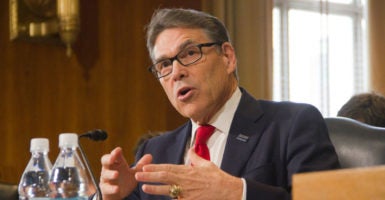Former Texas Gov. Rick Perry recently had his confirmation hearing before the Senate Energy and Natural Resources Committee.
If confirmed as energy secretary, Perry should work with Congress to reduce the size and scope of the agency’s intrusive reach into energy markets. Here are three priorities:
1. Stop and eliminate taxpayer-backed loans and loan guarantees.
On his way out the door, Secretary of Energy Ernest Moniz has announced a conditional loan guarantee for a fossil fuel project—a blatant, taxpayer-backed subsidy of up to $2 billion for Lake Charles Methanol, LLC. Such federal government meddling in the energy sector is the exact wrong approach to America’s energy policy.
The Department of Energy’s loan guarantee program provides taxpayer-backed loans to politically favored clean technologies that are “typically unable to obtain conventional private financing due to high technology risks.” Lake Charles Methanol, for example, is building the world’s first methanol plant using carbon capture technology for enhanced oil recovery.
Too much risk is often a reason why projects do not receive financial backing. Or, companies may have better options for their investment dollars. Regardless of why projects fail to secure private investment funds, it’s not a legitimate function of government to fill the void by financing projects on the backs of taxpayers.
The Department of Energy’s loan programs are a double-edged sword for the American economy. Either the government subsidizes likely-to-fail projects, thus throwing away taxpayer dollars, or it provides corporate welfare, keeping politically favored activities alive while diminishing the innovative role of the entrepreneur and private investment.
It’s a lose-lose proposition.
2. Eliminate spending on applied research and technology commercialization.
The Department of Energy spends billions of dollars annually to drive specific energy technologies to the market. As with the loan guarantee programs, commercially viable energy sources do not need support from the taxpayer.
Eliminating such wasteful spending will remove government intervention that diverts capital from the private sector to government-supported projects.
Instead of spending taxpayer dollars on a variety of politically preferred energy technologies and hoping for the next energy revolution to come through government planning, the federal government should recognize how successful free enterprise has been in driving energy transformations and meeting consumer demand.
In conjunction with eliminating spending on technological development in the energy sector in the presidential budget, President Donald Trump should appoint an undersecretary for the sole purpose of phasing out the applied offices within the Department of Energy.
Eliminating these offices will send a strong message that the government does not need to intervene in energy markets, whether it is for conventional fuels or renewable ones.
Proper reform will produce a more effective, flexible national laboratory system that is focused less on serving members of Congress’ pet projects and more on the country’s national priorities focused on basic research and scientific discovery and exploration.
3. Refrain from issuing new energy efficiency standards, and urge Congress to repeal the old energy conservation standards.
The secretary should order the Department of Energy not to implement or revise any new efficiency standards and recommend that Congress pass legislation eliminating all efficiency standards, leaving it to the states unless state regulations violate interstate commerce.
The Energy Policy and Conservation Act, as amended, authorizes the Department of Energy to develop and implement maximum energy-use standards for appliances and equipment.
The department currently regulates energy use from more than 60 appliances and products, including refrigerators, air conditioners, furnaces, televisions, showerheads, ovens, toilets, and light bulbs, and whatever the secretary determines or is petitioned to test.
Efficiency regulations are more about cronyism and controlling consumer choice than improving the environment. In fact, the department’s projected environmental benefits to Americans from reducing greenhouse gas emissions are a paltry one percent of the benefits projected from efficiency regulations.
In promulgating efficiency regulations, the Department of Energy prioritizes energy efficiency over other preferences customers have. For instance, the purchaser of a washing machine may prefer a faster cycle time than a slower one that saves water.
Moreover, the market generates efficiency without government intervention. The incentive for families and businesses to save money drives innovation to decrease prices and improve performance and efficiency.
The successful implementation of these priorities will go a long way to reforming American energy policy. Assuming Perry is confirmed by the Senate, he should make these three items the top of his agenda.































